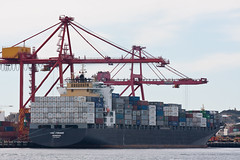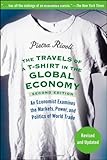First, let’s get the basics out of the way. From the World English Dictionary, we get this definition of Optimize:
2. ( tr ) to plan or carry out (an economic activity) with maximum efficiency
The world is a big place. There are billions of people that live in various places all around it. Heck, even at the poles. What is the role of trade, and, more specifically, the role of optimized trade in the world economy? A couple of days ago we spoke about isolationism and the stagnation that could occur after an isolationist stance is taken for a long enough time. The specific example was that eventually the supply and demand would reach an equilibrium. In truth, an equalized supply and demand trade system is a fully optimized trade system.
In our every day lives, we buy things that are made all around the world. In fact, it seems that we buy more foreign made items than we do domestic ones. Why? The common answer is that it’s cheaper to make these things in foreign countries than it is to make them here. Why is it cheaper? Because the trade to and from those countries has become optimized to the point that it’s so efficient that the costs of freighting those items here is still cheaper than making them here.
 Making trade routes more efficient through optimization reduces costs for trade along those routes. Many of the things that we have today wouldn’t be available to us if we hadn’t optimized the trade routes here. Consider oranges. They don’t grow up here in the northern plains. The only way to get them is to import them from someplace like Florida or California. If the trade routes between Florida and the northern plains hadn’t been optimized by the invention (and use) of the combustion engine and, later, the invention of the federal highway system, it would make oranges too expensive to ship way up here. The oranges would either rot on the way here, or the added expense of keeping the oranges from spoiling on the way here would be cost prohibitive. But, because that trade route has been optimized to a greater degree, it’s possible for me to go to the local grocery store and buy oranges that were grown in Florida for nearly the same price as I would for produce that was grown here.
Making trade routes more efficient through optimization reduces costs for trade along those routes. Many of the things that we have today wouldn’t be available to us if we hadn’t optimized the trade routes here. Consider oranges. They don’t grow up here in the northern plains. The only way to get them is to import them from someplace like Florida or California. If the trade routes between Florida and the northern plains hadn’t been optimized by the invention (and use) of the combustion engine and, later, the invention of the federal highway system, it would make oranges too expensive to ship way up here. The oranges would either rot on the way here, or the added expense of keeping the oranges from spoiling on the way here would be cost prohibitive. But, because that trade route has been optimized to a greater degree, it’s possible for me to go to the local grocery store and buy oranges that were grown in Florida for nearly the same price as I would for produce that was grown here.
 Optimized trade has a grand role in the worlds economy. The more optimized the trade becomes the more likely it will be that things will be made in so many more places around the globe. It will become easier to get authentic items, rather than semi-authentic items made here. Eventually, when the trade has become optimized fully, a stagnant period will occur. That scenario is impossible to imagine right now, because there are so many parts of the world that have no access to optimized trade. We call them 3rd world countries. They are so far removed from the optimized trade that many of the things that you and I in our 1st world society take for granted are mere dreams for them. A fully optimized trade system would eliminate that. Who knows, maybe someone will invent the transporter and we’ll have instant transfer of freight. Imagine the possibilities!
Optimized trade has a grand role in the worlds economy. The more optimized the trade becomes the more likely it will be that things will be made in so many more places around the globe. It will become easier to get authentic items, rather than semi-authentic items made here. Eventually, when the trade has become optimized fully, a stagnant period will occur. That scenario is impossible to imagine right now, because there are so many parts of the world that have no access to optimized trade. We call them 3rd world countries. They are so far removed from the optimized trade that many of the things that you and I in our 1st world society take for granted are mere dreams for them. A fully optimized trade system would eliminate that. Who knows, maybe someone will invent the transporter and we’ll have instant transfer of freight. Imagine the possibilities!
Image Credit: Freight Ship by SpammT, on Flickr

Shane Ede is a business teacher and personal finance blogger. He holds dual Bachelors degrees in education and computer sciences, as well as a Masters Degree in educational technology. Shane is passionate about personal finance, literacy and helping others master their money. When he isn’t enjoying live music, Shane likes spending time with family, barbeque and meteorology.

 People can be isolationist as well. We each have a personal economy. And each of our economies is a bit different. When we treat our economy with an isolationist view, we too can stagnate. But, how do we do that? The most extreme example is to take all of your money and put it in a coffee can and then bury it in the back yard. Or to take all of your money and stuff it in between the mattress and the boxspring. That money is isolated from the economies of other people. And while it isn’t necessarily shrinking (as long as you aren’t buying things), it also isn’t growing at all.
People can be isolationist as well. We each have a personal economy. And each of our economies is a bit different. When we treat our economy with an isolationist view, we too can stagnate. But, how do we do that? The most extreme example is to take all of your money and put it in a coffee can and then bury it in the back yard. Or to take all of your money and stuff it in between the mattress and the boxspring. That money is isolated from the economies of other people. And while it isn’t necessarily shrinking (as long as you aren’t buying things), it also isn’t growing at all. But, has this evolution of the stock market become a cancer on the world? So much of our economy relies on the stock market as an indicator of the world economic health. If stocks drop, so too does much of the rest of the economy. And if a company does poorly, and many of it’s shareholders sell, causing the price to drop, it can have a ripple effect on the rest of the industries companies, or even on the stock market as a whole. In May of 2010, just such a sell off caused a drop in the stock market that had the entire world trembling in fear of a worldwide economic collapse. It was caused by a trigger in an computer algorithm that was mistakenly set wrong. Many of the stock markets closed early to try (unscheduled rather than one of the normal stock market holidays) and curb the crash and hold off a more drastic drop.
But, has this evolution of the stock market become a cancer on the world? So much of our economy relies on the stock market as an indicator of the world economic health. If stocks drop, so too does much of the rest of the economy. And if a company does poorly, and many of it’s shareholders sell, causing the price to drop, it can have a ripple effect on the rest of the industries companies, or even on the stock market as a whole. In May of 2010, just such a sell off caused a drop in the stock market that had the entire world trembling in fear of a worldwide economic collapse. It was caused by a trigger in an computer algorithm that was mistakenly set wrong. Many of the stock markets closed early to try (unscheduled rather than one of the normal stock market holidays) and curb the crash and hold off a more drastic drop.